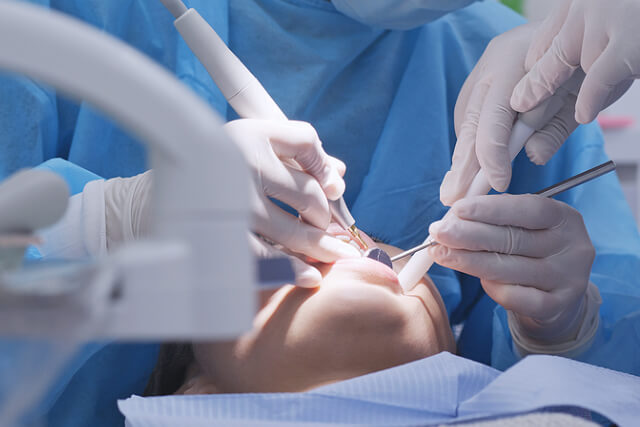Situations When A Tooth Extraction Becomes A Necessity
Seeing as how the tooth enamel is the hardest substance in the body – even stronger than bone – one would think that they would able to withstand any sort of damage and last for a lifetime. Unfortunately, this is simply not the case. As with any part of your body, the tooth enamel is made up of tissue called dentine. Despite being durable and damage-resistant, dentine is also subjected to wear and tear, and ageing. Sometimes, teeth can be damaged by trauma or decay and if it’s not looked into, the problem may exacerbate and develop into something more complex.
In most cases, the dentist will try to treat your dental issue and salvage your affected tooth; but if all other treatment options have been exhausted, they’d have to resort to the last resort: tooth extraction.
The Two Types Of Extraction Procedures
Tooth extraction is a treatment wherein a tooth is removed from its socket, or also known as dental alveolus. There are two different types of extraction of procedures and choosing between the two is highly dependent on the state of your affected tooth. If the tooth is visible and can be grasped with forceps, the dentist will simply pull it out via a simple extraction. To reduce the discomfort and pain, you would be placed under local anaesthesia.
However, should the affected tooth may have broken below the gumline or may not have emerged out of the gums entirely, what happens then? The affected tooth is no longer visible, nor can a dentist access it with their forceps. Should this happen, a surgical extraction will be performed. The dentist will start by creating an incision on the gums to elevate the soft tissue covering the tooth. Similarly, you’d be under the general anaesthesia to alleviate the pain.
Reasons For A Tooth Extraction
There is a multitude of reasons why one should opt for tooth extraction. The following are some situations that require a tooth extraction dentist to pull out the affected tooth, lest it aggravates and worsens.
1. Traumatic Damage
Trauma, in this case, is defined as a body caused by sudden physical injury from impact, violence or accident. In such situations, there are 2 types of injury to the tooth that may require an extraction: luxation and fracture.
Luxation refers to the loosening of tooth and fracture is defined as the breaking of a tooth. In fact, it’s not uncommon for the tooth to be split into several pieces either.
Of course, the ideal option is to preserve the affected tooth however they can. To do so, dental bonding, bridges or veneers are usually recommended. If tooth preservation is not an option, then tooth extraction is the only way to go.
2. Eliminating Overcrowding
As the milk teeth fall out to make way for the permanent teeth, one will come to know the possibility of a wisdom teeth extraction that looms over one’s head as one grows older. One of the main reasons why wisdom tooth extraction is so common is due to overcrowding, when the set of teeth has run out of real estate in the mouth. In such cases, it may push the neighbouring teeth and go out of alignment.
Whether it’d be the wisdom teeth or otherwise, a severe case of overcrowding may require the extraction of one or several teeth. An extraction can also give way to orthodontia practices, such as metal braces treatment and the like, to correct your teeth’s alignment now that there is more room in your mouth for the teeth to move.
3. Impacted Tooth
Impacted tooth refers to a tooth that becomes stuck below the surface of your gums and may then grow at an odd angle. Not only is this an issue in an all by itself, it will also cause complications for the neighbouring teeth.
4. Periodontal Disease
Periodontal disease refers to the infection of the gums, alveolar bone, periodontal ligaments or the like. It is mainly caused by the bacteria that sit in dental plaque formed by infrequent brushing and flossing. Severe periodontal disease will not just affect your teeth, but also your gums. In such cases, the tooth may become loose or severely damaged and will thus require an extraction.
5. Tooth Damage Caused By Severe Decay
On a similar tangent, dental plaque doesn’t just invite bacteria, but can also turn sugars into acid. This will soften the tooth enamel and damage the structure of the tooth, creating cavities, which are holes in your teeth. Severe tooth decay happens it exposes the centre of the tooth, making the pulp vulnerable to bacterial infection. In which case, a root canal procedure is usually the first step to treating the said infection. If it doesn’t respond, an extraction may be necessary to prevent the infection from spreading.
Teeth extraction procedure is only done when there are no other options left. At Luminous Dental, our team of talented and experienced dentists are equipped with the practical know-how to solve all your dental needs. Undoubtedly, we will do whatever we can to preserve the existing teeth and exhaust every other type of treatments before considering teeth extraction. Should we be unable to preserve the existing teeth, you may want to discuss the dental implant price and the possibilities of surgery on the same day of the extraction.
At Luminous Dental, we know the value of a beautiful smile and will go the extra mile to help you achieve a smile you’d be proud of.

